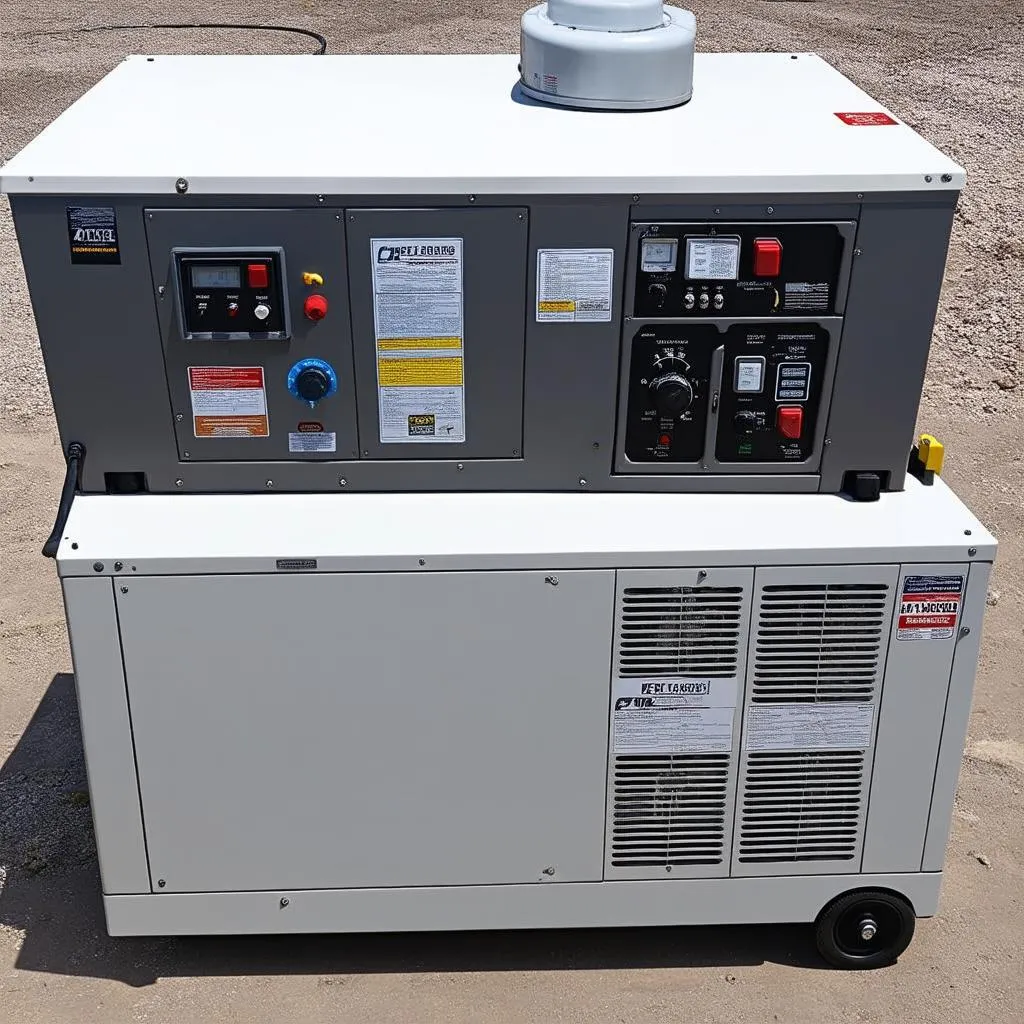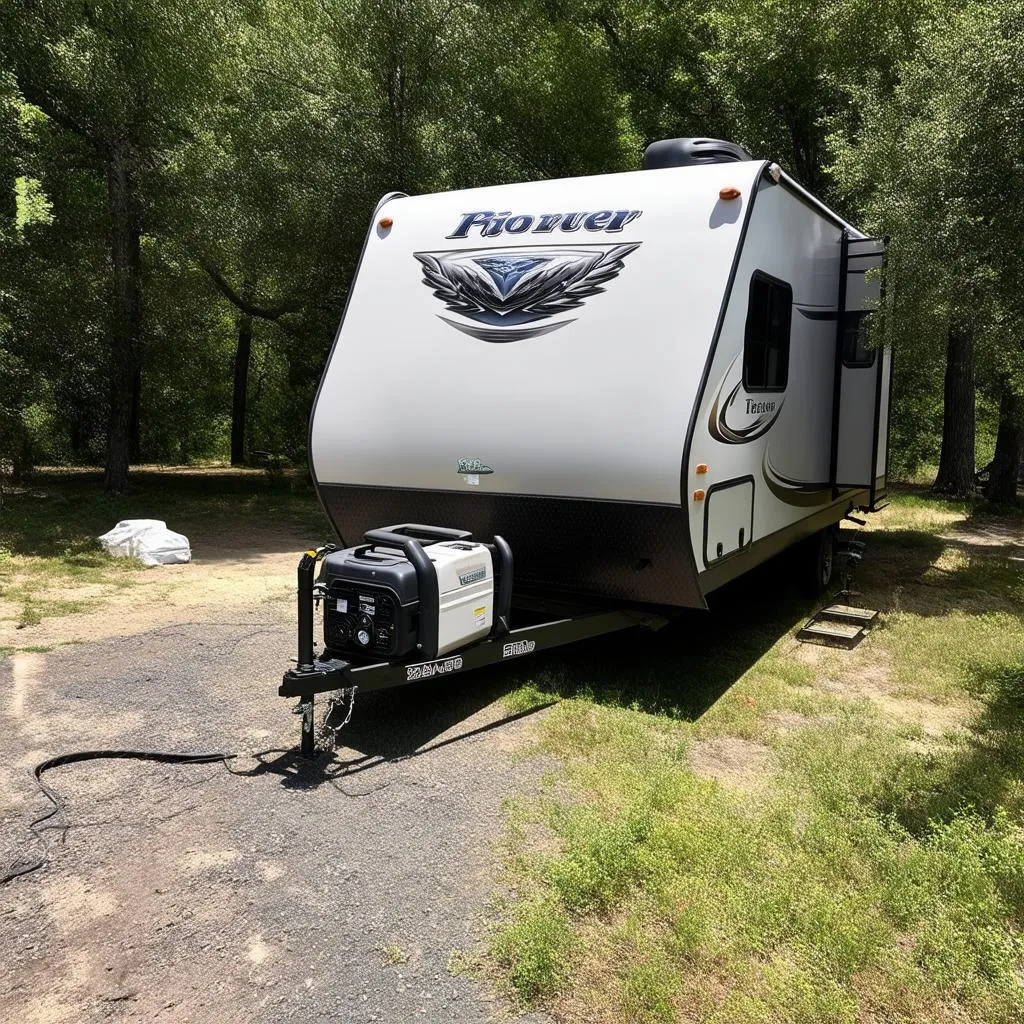“The open road is calling!” That’s what John and Mary kept hearing in their heads as they planned their cross-country road trip from bustling New York City to sunny Los Angeles. They’d rented a spacious travel trailer, eager to explore national parks like the Grand Canyon and Yosemite. However, there was one important detail they hadn’t quite figured out – what size generator would they need to power their home-away-from-home?
Choosing the right generator for your travel trailer can feel like navigating a maze, especially if you’re new to RV living. Too small, and you risk constantly tripping breakers or going without essential appliances. Too large, and you’re stuck with unnecessary weight and fuel consumption. So, how do you find the Goldilocks generator – the one that’s just right? Let’s break it down:
Understanding Your Power Needs
Before you even start browsing generators, you need a clear understanding of your travel trailer’s power consumption. Think about all the appliances and devices you’ll be using, including:
- Air conditioner: This is typically the biggest energy hog in a travel trailer.
- Refrigerator: A necessity for keeping food fresh on the road.
- Microwave: For quick meals and reheating leftovers.
- Lights: Don’t forget about interior and exterior lighting.
- Water heater: For showers and washing up.
- Entertainment devices: This could include a TV, laptop, or sound system.
Calculating Your Total Wattage
- Check appliance labels: Each appliance should have a label indicating its wattage (W) or amperage (A).
- Watts = Amps x Volts: If you only have amps, multiply by the voltage (typically 120V in a travel trailer) to get the wattage.
- Starting vs. Running Watts: Keep in mind that some appliances, like air conditioners, require a surge of power to start up. This is known as “starting wattage” and is significantly higher than the “running wattage.”
Pro Tip from seasoned RVer, Lisa K.: “Don’t underestimate your power needs! I always add a 20% buffer to my total wattage calculation, just in case.”
Choosing the Right Generator Size
Now that you know your total wattage, you can start shopping for a generator. Here’s a general guideline:
Small Travel Trailers (Under 25 feet):
- 2,000 – 3,000 watts: Ideal for running basic appliances and a small air conditioner.
Medium Travel Trailers (25 – 35 feet):
- 3,000 – 4,000 watts: Can handle most appliances, including a larger air conditioner.
Large Travel Trailers (Over 35 feet):
- 4,000 – 6,000 watts: Necessary for powering multiple high-wattage appliances simultaneously.
Remember: These are just estimates. Your specific needs may vary depending on your travel trailer and usage habits.
Generator Types: Inverter vs. Conventional
Conventional Generators:
- Pros: Affordable, widely available, and powerful.
- Cons: Noisier, less fuel-efficient, and can produce less stable power.
Inverter Generators:
- Pros: Quieter, more fuel-efficient, and produce cleaner power, making them ideal for sensitive electronics.
- Cons: More expensive than conventional generators.
Making the Decision
For budget-conscious travelers: A conventional generator might be a suitable option if noise isn’t a major concern.
For those prioritizing peace and quiet: An inverter generator offers a quieter and more fuel-efficient experience.
 Types of Generators
Types of Generators
Planning Your Trip: Generator Tips
- Check campground rules: Some campgrounds have restrictions on generator usage, including hours of operation and noise levels.
- Invest in a generator cover: This will help muffle noise and protect your generator from the elements.
- Practice generator safety: Always operate your generator in a well-ventilated area, away from flammable materials.
Expert Insight from “The RV Handbook” by Robert M.: “Proper generator maintenance is crucial for longevity. Regularly check oil levels, air filters, and spark plugs.”
FAQs
Can I run my travel trailer’s air conditioner on a generator?
Yes, but you’ll need a generator with enough wattage to handle the air conditioner’s starting and running wattage.
How long can I run a generator on a full tank of fuel?
This varies depending on the generator’s size and fuel efficiency, but most generators can run for 8-12 hours on a full tank.
Do I need a special outlet for my generator?
Yes, you’ll need a generator power cord that’s compatible with your travel trailer’s electrical system.
 Travel Trailer with Generator Setup
Travel Trailer with Generator Setup
Exploring the Open Road with Travelcar.edu.vn
Choosing the right generator is just one piece of the puzzle when it comes to planning an unforgettable RV adventure. For more tips and resources on all things travel trailer related, visit travelcar.edu.vn. We offer a wealth of information to help you plan your perfect trip, from choosing the right RV to finding the best campgrounds across the US. Remember, adventure awaits!
Ready to hit the road? Share your travel plans and generator tips in the comments below!